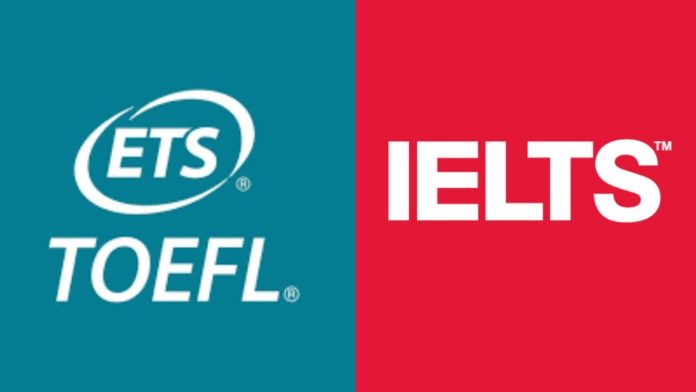Are you trying to decide between TOEFL and IELTS for your English proficiency test? Both are prominent exams crucial for studying abroad or immigration. This article provides a detailed comparison to help you choose the right test.
TOEFL or IELTS: A Brief Overview
TOEFL (Test of English as a Foreign Language) is administered by the Educational Testing Service (ETS) in the United States. It primarily assesses the ability to use and understand English in an academic setting.
IELTS (International English Language Testing System) is jointly managed by the British Council, IDP Education, IELTS Australia, and Cambridge Assessment English. It is used for educational, immigration, and professional purposes, assessing listening, speaking, writing, and reading skills.
TOEFL vs IELTS: Similarities and Differences
Acceptance:
- TOEFL: Accepted by over 11,000 institutions in 150+ countries, especially popular in the US.
- IELTS: Accepted by over 10,000 organizations worldwide, particularly in the UK, Australia, Canada, and New Zealand.
Mode of Conduct:
- TOEFL:
- Internet-based (iBT) and home proctor-monitored.
- Paper-based option in areas without internet connectivity.
- Includes integrated tasks testing speaking, listening, reading, and writing skills.
- IELTS:
- Two versions: Academic (for students and researchers) and General Training (for professionals and immigration).
- Available in both paper-based and computer-based formats.
- Speaking section conducted face-to-face with an examiner.
Our Verdict: If you prefer face-to-face speaking tests, IELTS might be better. For those comfortable with computer-based tests, TOEFL iBT is more suitable.
Cost of Registration
- TOEFL iBT: $160-$250, depending on location. Additional fees for rescheduling, score reviews, and extra score reports.
- IELTS: $215-$240, varying by country. Additional fees for rescheduling, extra score reports, and cancellations.
Number of Questions
- TOEFL iBT:
- Reading: 36-56 questions.
- Listening: 34-51 questions.
- Speaking: 6 tasks.
- Writing: 2 tasks.
- IELTS:
- Listening: 40 questions.
- Reading: 40 questions.
- Writing: 2 tasks.
- Speaking: Face-to-face interview with three parts.
Validity
Both TOEFL and IELTS scores are valid for two years from the test date.
Scoring Systems
- IELTS: Uses a band scale from 0 to 9 for each section. The overall band score is the average of these four section scores, rounded to the nearest whole or half band.
- TOEFL iBT: Scores each section (Reading, Listening, Speaking, Writing) on a scale of 0 to 30. The total score ranges from 0 to 120, the sum of the four section scores.
Score Comparison
TOEFL:
- 118-120: Expert user (equivalent to IELTS Band 9)
- 110-117: Very good user (equivalent to IELTS Band 8)
- 94-109: Good user (equivalent to IELTS Band 7)
- 60-93: Competent to modest user (equivalent to IELTS Band 6-5)
- 46-59: Limited user (equivalent to IELTS Band 4)
- 32-45: Extremely limited user (equivalent to IELTS Band 3)
- 0-31: Intermittent to non-user (equivalent to IELTS Band 2-1)
IELTS:
- Band 9: Expert user
- Band 8: Very good user
- Band 7: Good user
- Band 6: Competent user
- Band 5: Modest user
- Band 4: Limited user
- Band 3: Extremely limited user
- Band 2: Intermittent user
- Band 1: Non-user
- Band 0: Did not attempt the test
Preparation
- IELTS: Focused practice in listening, reading, writing, and speaking. Various resources available including practice tests, books, and online courses.
- TOEFL: Enhances reading comprehension, listening abilities, speaking fluency, and writing proficiency. ETS provides official preparation materials along with numerous other resources.
Retake Policy
- IELTS: Can be retaken as soon as you feel ready, with no restrictions on the number of attempts.
- TOEFL iBT: Can be retaken after a minimum of three days from the previous test date.
Which Test Should You Choose?
Consider the following factors:
- Test Format: IELTS if you prefer face-to-face speaking; TOEFL iBT if comfortable with computer-based tests.
- Location and Availability: Check availability of test centers in your area.
- Institution Requirements: Verify preferred test for the universities or organizations you are applying to.
- Preparation Style: Choose the test that aligns better with your skills and preparation style.
Frequently Asked Questions About TOEFL or IELTS
Is TOEFL accepted by UK universities? Yes, TOEFL iBT is accepted by all universities in the UK.
Can TOEFL be used for a UK Visa? Yes, though IELTS is more common for UK Visa applications.
Can I take both IELTS and TOEFL? One is sufficient for most purposes, but taking both can strengthen your application.
Which Countries require IELTS or TOEFL for International Students? Generally required in the US, UK, Australia, New Zealand, Canada, UAE, and Saudi Arabia for students from non-English speaking countries.
What is the minimum TOEFL or IELTS Score? The minimum score is set by the university or host country.
Conclusion
Both IELTS and TOEFL are globally recognized and accepted English proficiency tests, assessing the same fundamental skills but differing in format, cost, scoring, and other parameters. Choose based on your academic or professional goals to ensure the best fit for your future endeavors. If you found this post helpful, share it with family and friends on other platforms.





